Analysis of Tourism Impacts and Mitigation Strategies Report
VerifiedAdded on 2023/02/01
|10
|2289
|51
Report
AI Summary
This report critically analyzes the multifaceted impacts of tourism, focusing on social, economic, and environmental consequences. It examines negative social effects like cultural erosion and unethical behaviors, economic inequalities stemming from spending patterns and job disparities, and environmental concerns such as pollution and ecosystem degradation. The report further explores potential mitigation strategies, including promoting sustainable tourism practices, utilizing market-related instruments, supporting local economies, providing tourist education, and establishing community-based approaches. The analysis emphasizes the importance of responsible tourism management to ensure the preservation of destinations and the well-being of local communities and environments. The report concludes with a call for community involvement and education to foster a more sustainable and ethical approach to tourism development.
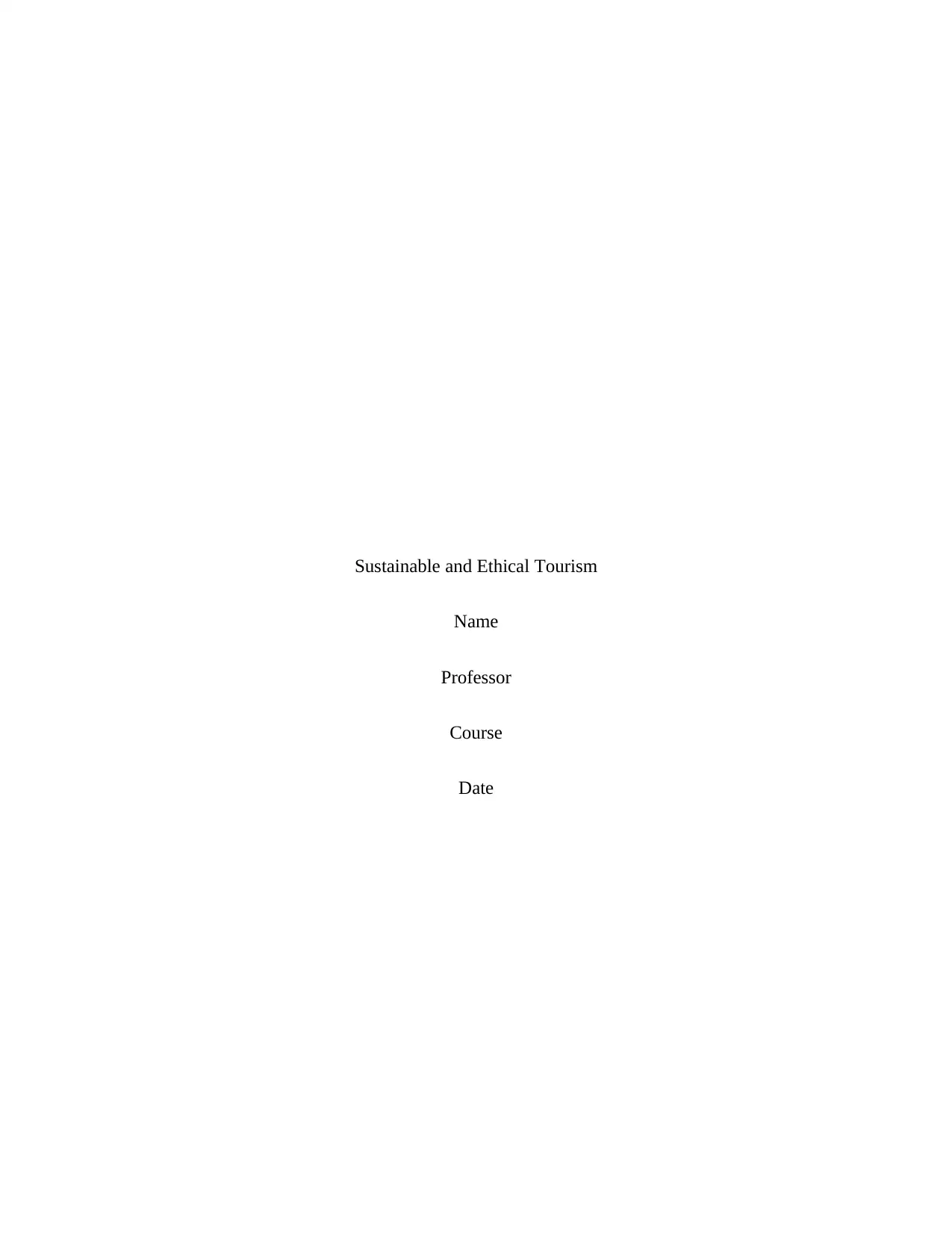
Sustainable and Ethical Tourism
Name
Professor
Course
Date
Name
Professor
Course
Date
Paraphrase This Document
Need a fresh take? Get an instant paraphrase of this document with our AI Paraphraser
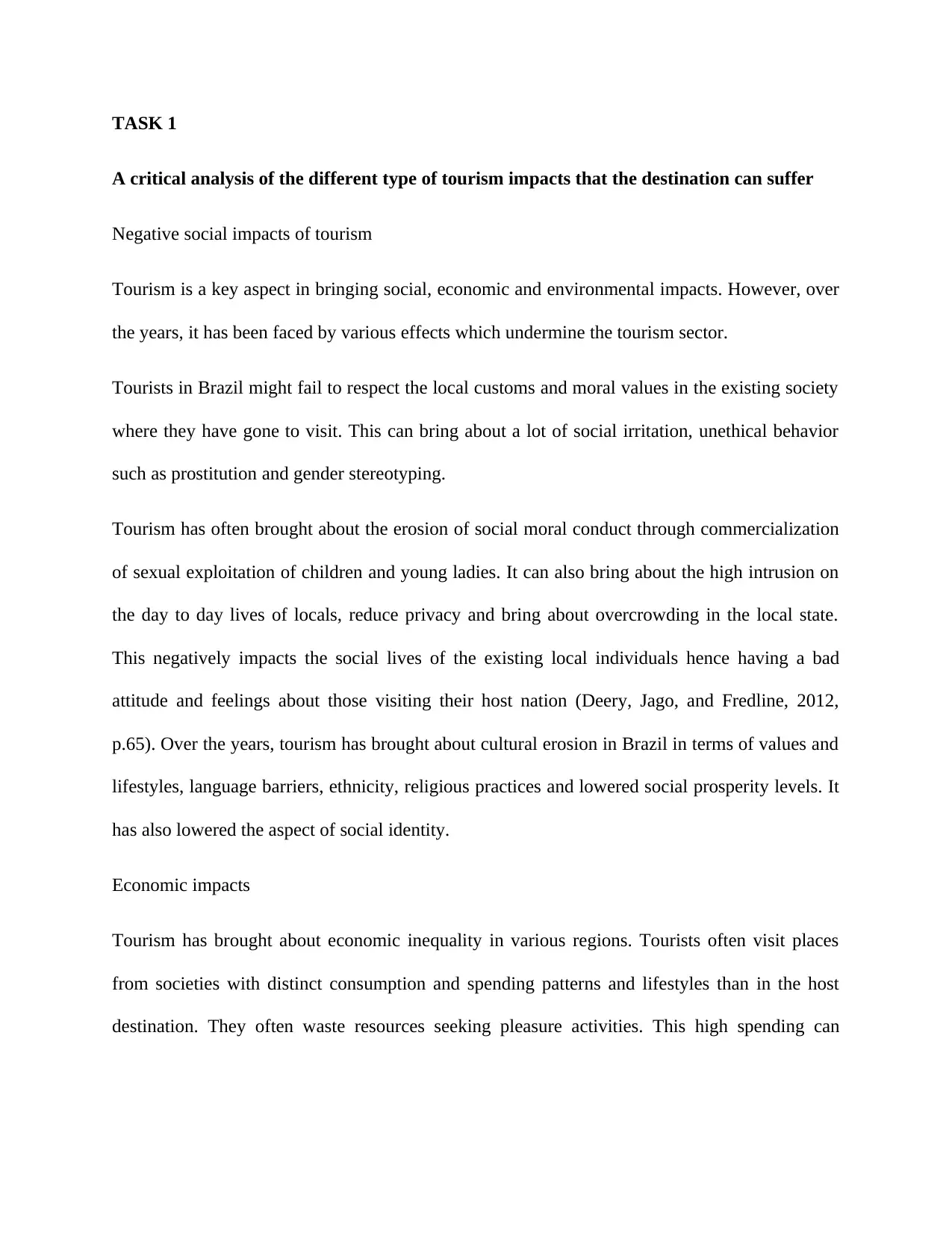
TASK 1
A critical analysis of the different type of tourism impacts that the destination can suffer
Negative social impacts of tourism
Tourism is a key aspect in bringing social, economic and environmental impacts. However, over
the years, it has been faced by various effects which undermine the tourism sector.
Tourists in Brazil might fail to respect the local customs and moral values in the existing society
where they have gone to visit. This can bring about a lot of social irritation, unethical behavior
such as prostitution and gender stereotyping.
Tourism has often brought about the erosion of social moral conduct through commercialization
of sexual exploitation of children and young ladies. It can also bring about the high intrusion on
the day to day lives of locals, reduce privacy and bring about overcrowding in the local state.
This negatively impacts the social lives of the existing local individuals hence having a bad
attitude and feelings about those visiting their host nation (Deery, Jago, and Fredline, 2012,
p.65). Over the years, tourism has brought about cultural erosion in Brazil in terms of values and
lifestyles, language barriers, ethnicity, religious practices and lowered social prosperity levels. It
has also lowered the aspect of social identity.
Economic impacts
Tourism has brought about economic inequality in various regions. Tourists often visit places
from societies with distinct consumption and spending patterns and lifestyles than in the host
destination. They often waste resources seeking pleasure activities. This high spending can
A critical analysis of the different type of tourism impacts that the destination can suffer
Negative social impacts of tourism
Tourism is a key aspect in bringing social, economic and environmental impacts. However, over
the years, it has been faced by various effects which undermine the tourism sector.
Tourists in Brazil might fail to respect the local customs and moral values in the existing society
where they have gone to visit. This can bring about a lot of social irritation, unethical behavior
such as prostitution and gender stereotyping.
Tourism has often brought about the erosion of social moral conduct through commercialization
of sexual exploitation of children and young ladies. It can also bring about the high intrusion on
the day to day lives of locals, reduce privacy and bring about overcrowding in the local state.
This negatively impacts the social lives of the existing local individuals hence having a bad
attitude and feelings about those visiting their host nation (Deery, Jago, and Fredline, 2012,
p.65). Over the years, tourism has brought about cultural erosion in Brazil in terms of values and
lifestyles, language barriers, ethnicity, religious practices and lowered social prosperity levels. It
has also lowered the aspect of social identity.
Economic impacts
Tourism has brought about economic inequality in various regions. Tourists often visit places
from societies with distinct consumption and spending patterns and lifestyles than in the host
destination. They often waste resources seeking pleasure activities. This high spending can
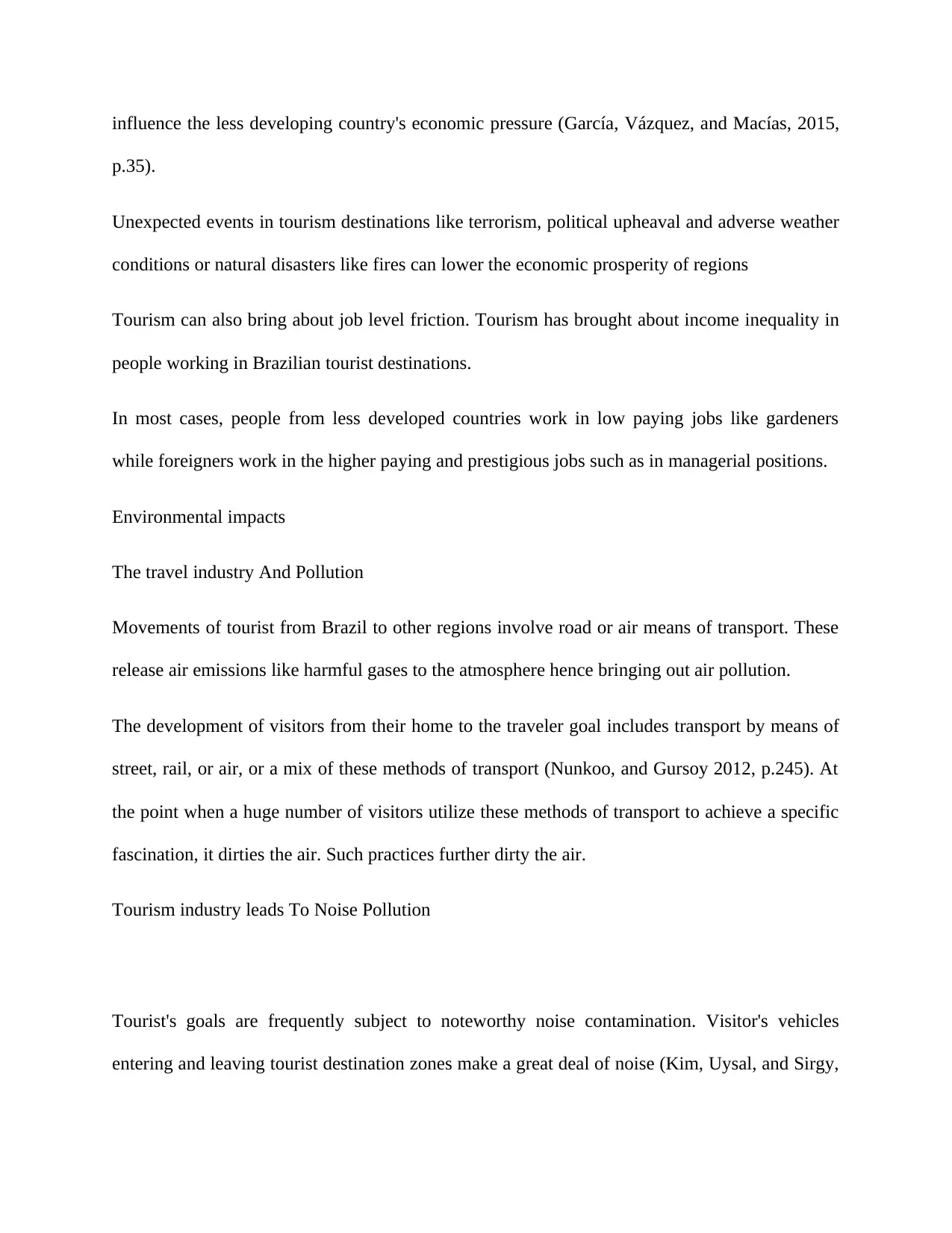
influence the less developing country's economic pressure (García, Vázquez, and Macías, 2015,
p.35).
Unexpected events in tourism destinations like terrorism, political upheaval and adverse weather
conditions or natural disasters like fires can lower the economic prosperity of regions
Tourism can also bring about job level friction. Tourism has brought about income inequality in
people working in Brazilian tourist destinations.
In most cases, people from less developed countries work in low paying jobs like gardeners
while foreigners work in the higher paying and prestigious jobs such as in managerial positions.
Environmental impacts
The travel industry And Pollution
Movements of tourist from Brazil to other regions involve road or air means of transport. These
release air emissions like harmful gases to the atmosphere hence bringing out air pollution.
The development of visitors from their home to the traveler goal includes transport by means of
street, rail, or air, or a mix of these methods of transport (Nunkoo, and Gursoy 2012, p.245). At
the point when a huge number of visitors utilize these methods of transport to achieve a specific
fascination, it dirties the air. Such practices further dirty the air.
Tourism industry leads To Noise Pollution
Tourist's goals are frequently subject to noteworthy noise contamination. Visitor's vehicles
entering and leaving tourist destination zones make a great deal of noise (Kim, Uysal, and Sirgy,
p.35).
Unexpected events in tourism destinations like terrorism, political upheaval and adverse weather
conditions or natural disasters like fires can lower the economic prosperity of regions
Tourism can also bring about job level friction. Tourism has brought about income inequality in
people working in Brazilian tourist destinations.
In most cases, people from less developed countries work in low paying jobs like gardeners
while foreigners work in the higher paying and prestigious jobs such as in managerial positions.
Environmental impacts
The travel industry And Pollution
Movements of tourist from Brazil to other regions involve road or air means of transport. These
release air emissions like harmful gases to the atmosphere hence bringing out air pollution.
The development of visitors from their home to the traveler goal includes transport by means of
street, rail, or air, or a mix of these methods of transport (Nunkoo, and Gursoy 2012, p.245). At
the point when a huge number of visitors utilize these methods of transport to achieve a specific
fascination, it dirties the air. Such practices further dirty the air.
Tourism industry leads To Noise Pollution
Tourist's goals are frequently subject to noteworthy noise contamination. Visitor's vehicles
entering and leaving tourist destination zones make a great deal of noise (Kim, Uysal, and Sirgy,
⊘ This is a preview!⊘
Do you want full access?
Subscribe today to unlock all pages.

Trusted by 1+ million students worldwide
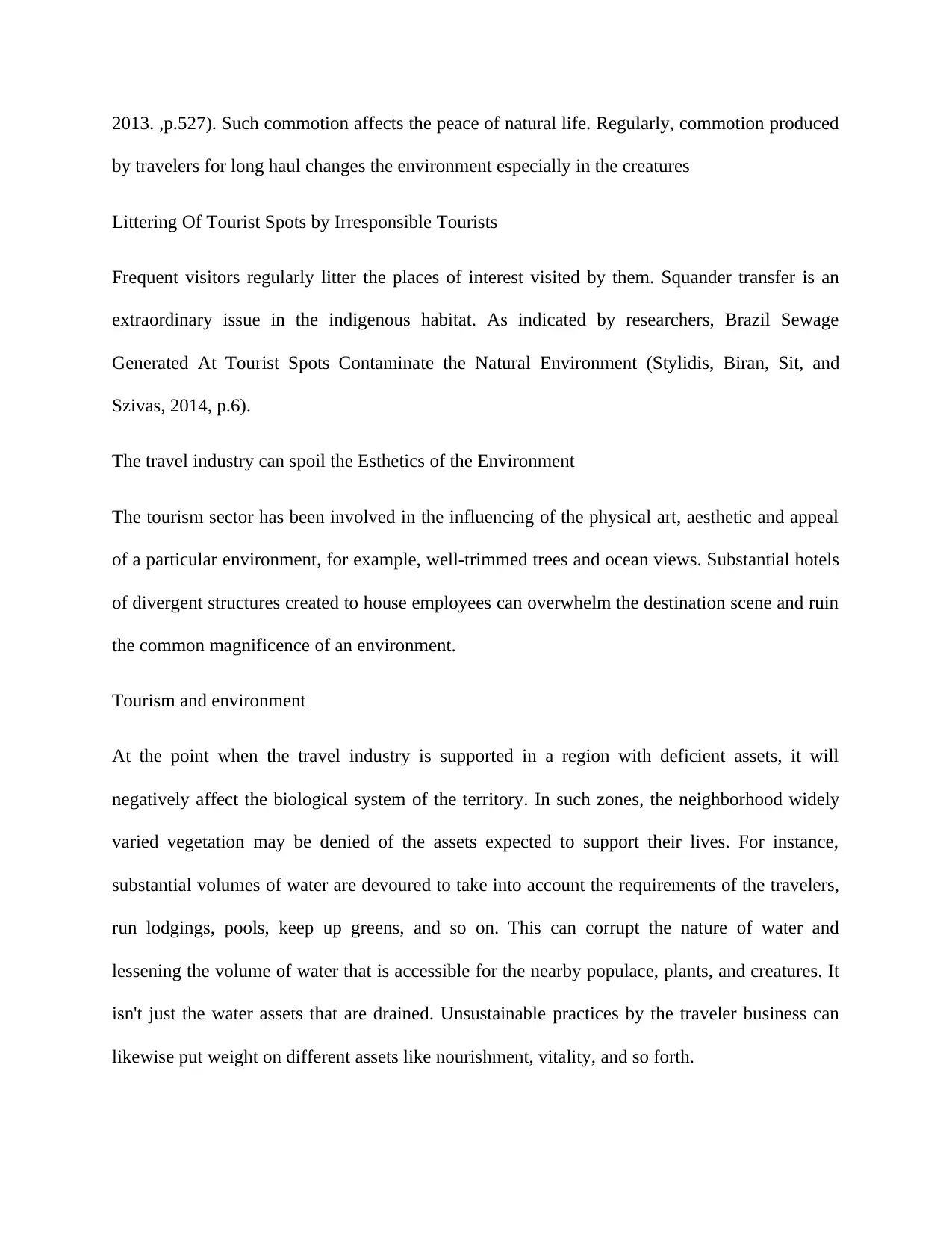
2013. ,p.527). Such commotion affects the peace of natural life. Regularly, commotion produced
by travelers for long haul changes the environment especially in the creatures
Littering Of Tourist Spots by Irresponsible Tourists
Frequent visitors regularly litter the places of interest visited by them. Squander transfer is an
extraordinary issue in the indigenous habitat. As indicated by researchers, Brazil Sewage
Generated At Tourist Spots Contaminate the Natural Environment (Stylidis, Biran, Sit, and
Szivas, 2014, p.6).
The travel industry can spoil the Esthetics of the Environment
The tourism sector has been involved in the influencing of the physical art, aesthetic and appeal
of a particular environment, for example, well-trimmed trees and ocean views. Substantial hotels
of divergent structures created to house employees can overwhelm the destination scene and ruin
the common magnificence of an environment.
Tourism and environment
At the point when the travel industry is supported in a region with deficient assets, it will
negatively affect the biological system of the territory. In such zones, the neighborhood widely
varied vegetation may be denied of the assets expected to support their lives. For instance,
substantial volumes of water are devoured to take into account the requirements of the travelers,
run lodgings, pools, keep up greens, and so on. This can corrupt the nature of water and
lessening the volume of water that is accessible for the nearby populace, plants, and creatures. It
isn't just the water assets that are drained. Unsustainable practices by the traveler business can
likewise put weight on different assets like nourishment, vitality, and so forth.
by travelers for long haul changes the environment especially in the creatures
Littering Of Tourist Spots by Irresponsible Tourists
Frequent visitors regularly litter the places of interest visited by them. Squander transfer is an
extraordinary issue in the indigenous habitat. As indicated by researchers, Brazil Sewage
Generated At Tourist Spots Contaminate the Natural Environment (Stylidis, Biran, Sit, and
Szivas, 2014, p.6).
The travel industry can spoil the Esthetics of the Environment
The tourism sector has been involved in the influencing of the physical art, aesthetic and appeal
of a particular environment, for example, well-trimmed trees and ocean views. Substantial hotels
of divergent structures created to house employees can overwhelm the destination scene and ruin
the common magnificence of an environment.
Tourism and environment
At the point when the travel industry is supported in a region with deficient assets, it will
negatively affect the biological system of the territory. In such zones, the neighborhood widely
varied vegetation may be denied of the assets expected to support their lives. For instance,
substantial volumes of water are devoured to take into account the requirements of the travelers,
run lodgings, pools, keep up greens, and so on. This can corrupt the nature of water and
lessening the volume of water that is accessible for the nearby populace, plants, and creatures. It
isn't just the water assets that are drained. Unsustainable practices by the traveler business can
likewise put weight on different assets like nourishment, vitality, and so forth.
Paraphrase This Document
Need a fresh take? Get an instant paraphrase of this document with our AI Paraphraser
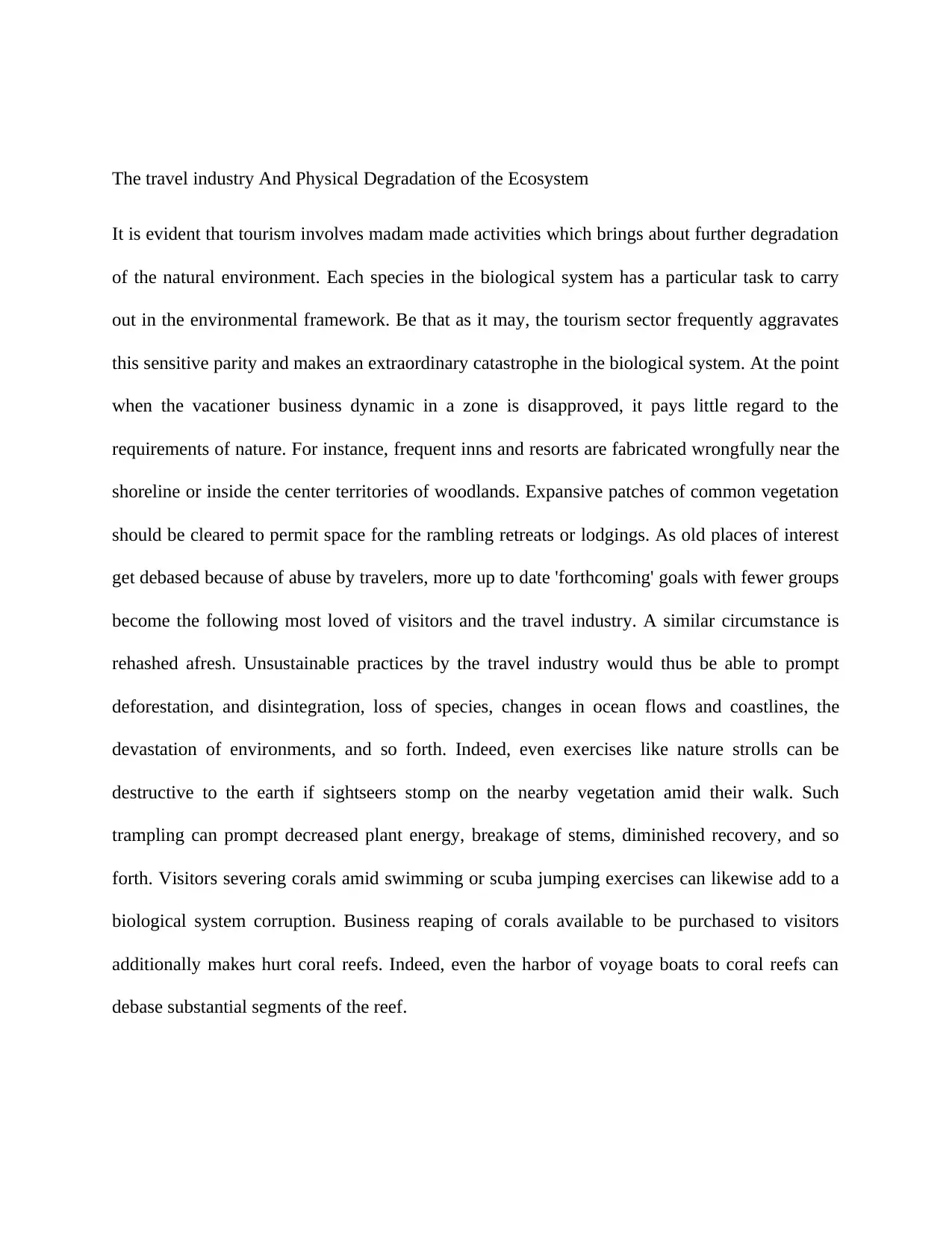
The travel industry And Physical Degradation of the Ecosystem
It is evident that tourism involves madam made activities which brings about further degradation
of the natural environment. Each species in the biological system has a particular task to carry
out in the environmental framework. Be that as it may, the tourism sector frequently aggravates
this sensitive parity and makes an extraordinary catastrophe in the biological system. At the point
when the vacationer business dynamic in a zone is disapproved, it pays little regard to the
requirements of nature. For instance, frequent inns and resorts are fabricated wrongfully near the
shoreline or inside the center territories of woodlands. Expansive patches of common vegetation
should be cleared to permit space for the rambling retreats or lodgings. As old places of interest
get debased because of abuse by travelers, more up to date 'forthcoming' goals with fewer groups
become the following most loved of visitors and the travel industry. A similar circumstance is
rehashed afresh. Unsustainable practices by the travel industry would thus be able to prompt
deforestation, and disintegration, loss of species, changes in ocean flows and coastlines, the
devastation of environments, and so forth. Indeed, even exercises like nature strolls can be
destructive to the earth if sightseers stomp on the nearby vegetation amid their walk. Such
trampling can prompt decreased plant energy, breakage of stems, diminished recovery, and so
forth. Visitors severing corals amid swimming or scuba jumping exercises can likewise add to a
biological system corruption. Business reaping of corals available to be purchased to visitors
additionally makes hurt coral reefs. Indeed, even the harbor of voyage boats to coral reefs can
debase substantial segments of the reef.
It is evident that tourism involves madam made activities which brings about further degradation
of the natural environment. Each species in the biological system has a particular task to carry
out in the environmental framework. Be that as it may, the tourism sector frequently aggravates
this sensitive parity and makes an extraordinary catastrophe in the biological system. At the point
when the vacationer business dynamic in a zone is disapproved, it pays little regard to the
requirements of nature. For instance, frequent inns and resorts are fabricated wrongfully near the
shoreline or inside the center territories of woodlands. Expansive patches of common vegetation
should be cleared to permit space for the rambling retreats or lodgings. As old places of interest
get debased because of abuse by travelers, more up to date 'forthcoming' goals with fewer groups
become the following most loved of visitors and the travel industry. A similar circumstance is
rehashed afresh. Unsustainable practices by the travel industry would thus be able to prompt
deforestation, and disintegration, loss of species, changes in ocean flows and coastlines, the
devastation of environments, and so forth. Indeed, even exercises like nature strolls can be
destructive to the earth if sightseers stomp on the nearby vegetation amid their walk. Such
trampling can prompt decreased plant energy, breakage of stems, diminished recovery, and so
forth. Visitors severing corals amid swimming or scuba jumping exercises can likewise add to a
biological system corruption. Business reaping of corals available to be purchased to visitors
additionally makes hurt coral reefs. Indeed, even the harbor of voyage boats to coral reefs can
debase substantial segments of the reef.
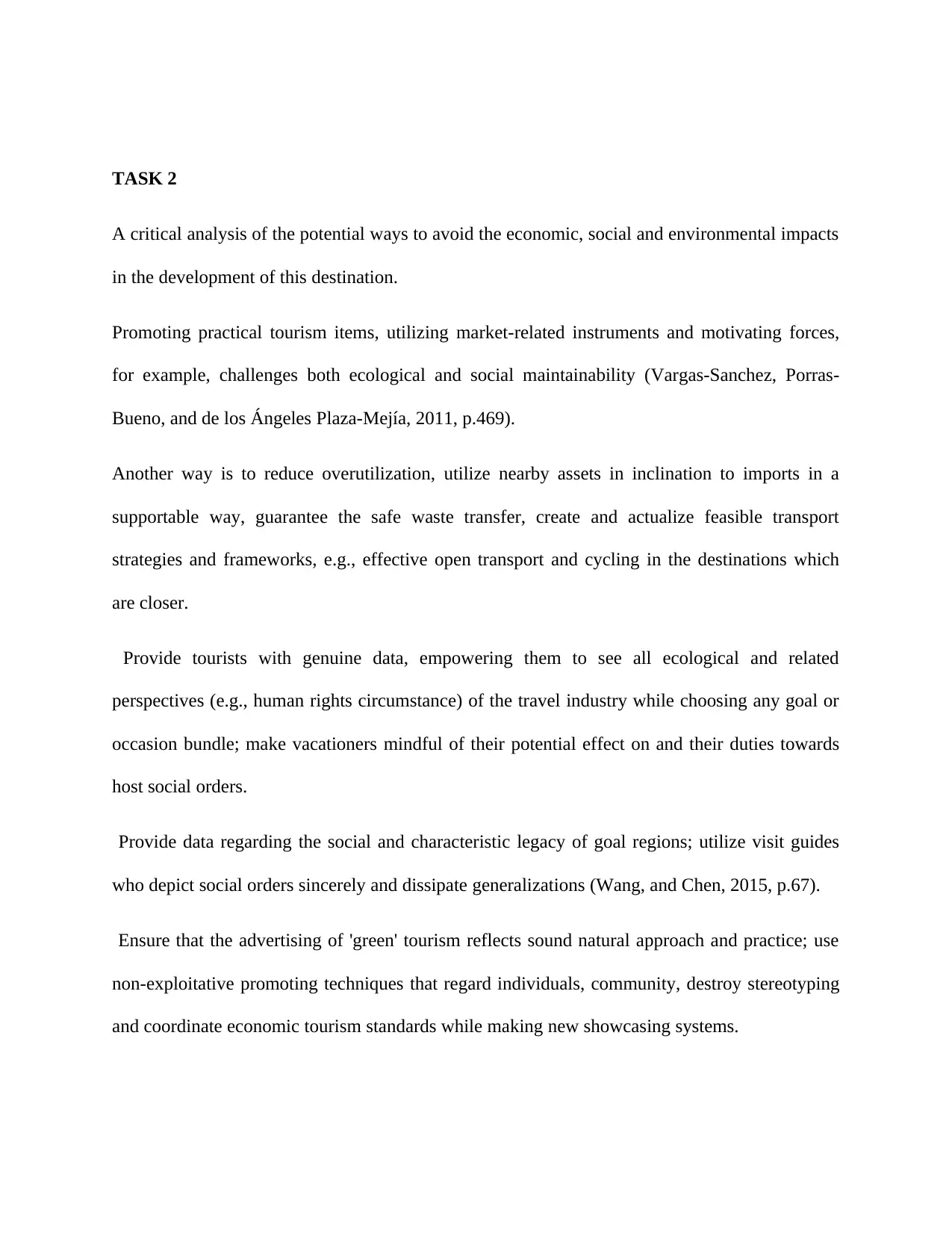
TASK 2
A critical analysis of the potential ways to avoid the economic, social and environmental impacts
in the development of this destination.
Promoting practical tourism items, utilizing market-related instruments and motivating forces,
for example, challenges both ecological and social maintainability (Vargas-Sanchez, Porras-
Bueno, and de los Ángeles Plaza-Mejía, 2011, p.469).
Another way is to reduce overutilization, utilize nearby assets in inclination to imports in a
supportable way, guarantee the safe waste transfer, create and actualize feasible transport
strategies and frameworks, e.g., effective open transport and cycling in the destinations which
are closer.
Provide tourists with genuine data, empowering them to see all ecological and related
perspectives (e.g., human rights circumstance) of the travel industry while choosing any goal or
occasion bundle; make vacationers mindful of their potential effect on and their duties towards
host social orders.
Provide data regarding the social and characteristic legacy of goal regions; utilize visit guides
who depict social orders sincerely and dissipate generalizations (Wang, and Chen, 2015, p.67).
Ensure that the advertising of 'green' tourism reflects sound natural approach and practice; use
non-exploitative promoting techniques that regard individuals, community, destroy stereotyping
and coordinate economic tourism standards while making new showcasing systems.
A critical analysis of the potential ways to avoid the economic, social and environmental impacts
in the development of this destination.
Promoting practical tourism items, utilizing market-related instruments and motivating forces,
for example, challenges both ecological and social maintainability (Vargas-Sanchez, Porras-
Bueno, and de los Ángeles Plaza-Mejía, 2011, p.469).
Another way is to reduce overutilization, utilize nearby assets in inclination to imports in a
supportable way, guarantee the safe waste transfer, create and actualize feasible transport
strategies and frameworks, e.g., effective open transport and cycling in the destinations which
are closer.
Provide tourists with genuine data, empowering them to see all ecological and related
perspectives (e.g., human rights circumstance) of the travel industry while choosing any goal or
occasion bundle; make vacationers mindful of their potential effect on and their duties towards
host social orders.
Provide data regarding the social and characteristic legacy of goal regions; utilize visit guides
who depict social orders sincerely and dissipate generalizations (Wang, and Chen, 2015, p.67).
Ensure that the advertising of 'green' tourism reflects sound natural approach and practice; use
non-exploitative promoting techniques that regard individuals, community, destroy stereotyping
and coordinate economic tourism standards while making new showcasing systems.
⊘ This is a preview!⊘
Do you want full access?
Subscribe today to unlock all pages.

Trusted by 1+ million students worldwide
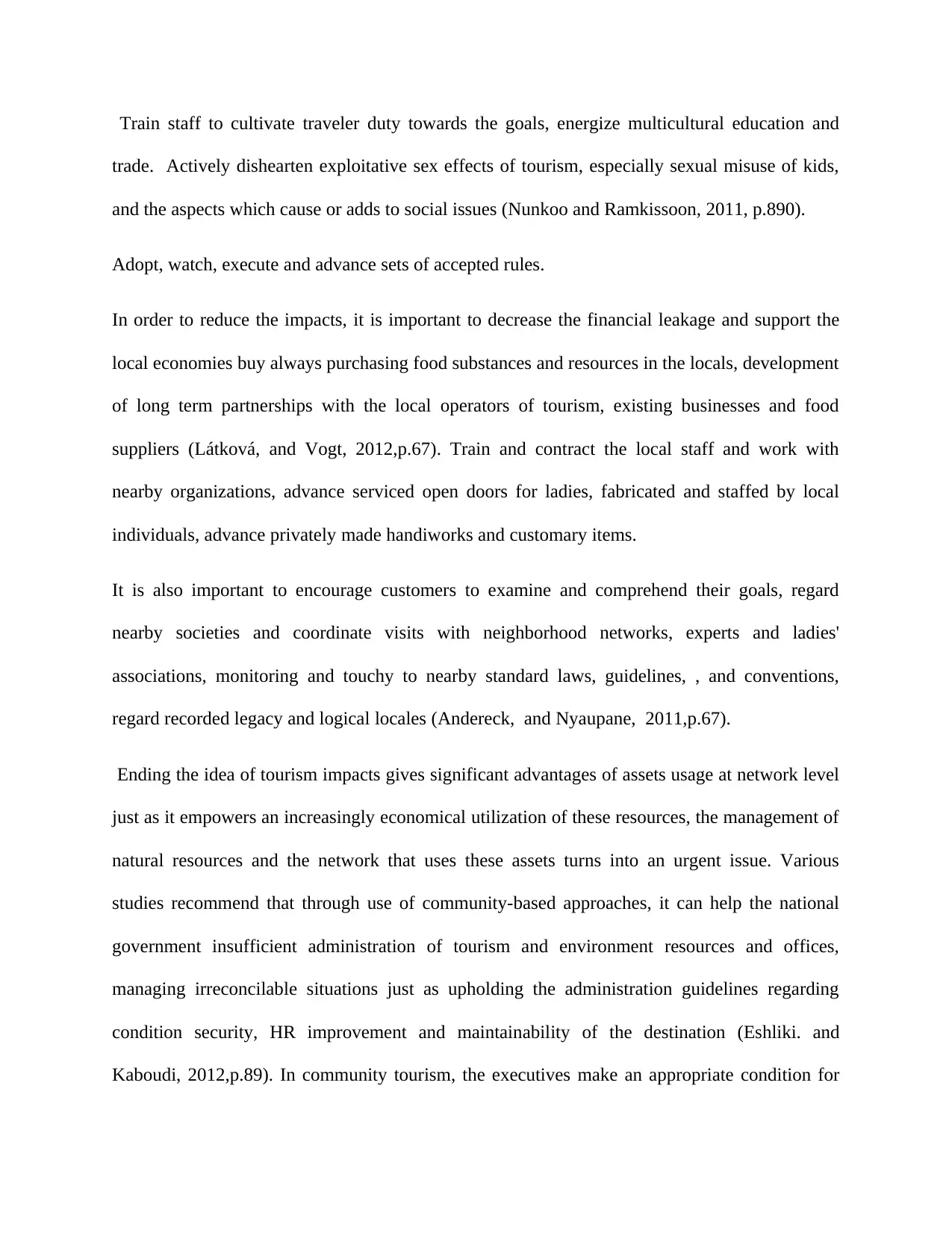
Train staff to cultivate traveler duty towards the goals, energize multicultural education and
trade. Actively dishearten exploitative sex effects of tourism, especially sexual misuse of kids,
and the aspects which cause or adds to social issues (Nunkoo and Ramkissoon, 2011, p.890).
Adopt, watch, execute and advance sets of accepted rules.
In order to reduce the impacts, it is important to decrease the financial leakage and support the
local economies buy always purchasing food substances and resources in the locals, development
of long term partnerships with the local operators of tourism, existing businesses and food
suppliers (Látková, and Vogt, 2012,p.67). Train and contract the local staff and work with
nearby organizations, advance serviced open doors for ladies, fabricated and staffed by local
individuals, advance privately made handiworks and customary items.
It is also important to encourage customers to examine and comprehend their goals, regard
nearby societies and coordinate visits with neighborhood networks, experts and ladies'
associations, monitoring and touchy to nearby standard laws, guidelines, , and conventions,
regard recorded legacy and logical locales (Andereck, and Nyaupane, 2011,p.67).
Ending the idea of tourism impacts gives significant advantages of assets usage at network level
just as it empowers an increasingly economical utilization of these resources, the management of
natural resources and the network that uses these assets turns into an urgent issue. Various
studies recommend that through use of community-based approaches, it can help the national
government insufficient administration of tourism and environment resources and offices,
managing irreconcilable situations just as upholding the administration guidelines regarding
condition security, HR improvement and maintainability of the destination (Eshliki. and
Kaboudi, 2012,p.89). In community tourism, the executives make an appropriate condition for
trade. Actively dishearten exploitative sex effects of tourism, especially sexual misuse of kids,
and the aspects which cause or adds to social issues (Nunkoo and Ramkissoon, 2011, p.890).
Adopt, watch, execute and advance sets of accepted rules.
In order to reduce the impacts, it is important to decrease the financial leakage and support the
local economies buy always purchasing food substances and resources in the locals, development
of long term partnerships with the local operators of tourism, existing businesses and food
suppliers (Látková, and Vogt, 2012,p.67). Train and contract the local staff and work with
nearby organizations, advance serviced open doors for ladies, fabricated and staffed by local
individuals, advance privately made handiworks and customary items.
It is also important to encourage customers to examine and comprehend their goals, regard
nearby societies and coordinate visits with neighborhood networks, experts and ladies'
associations, monitoring and touchy to nearby standard laws, guidelines, , and conventions,
regard recorded legacy and logical locales (Andereck, and Nyaupane, 2011,p.67).
Ending the idea of tourism impacts gives significant advantages of assets usage at network level
just as it empowers an increasingly economical utilization of these resources, the management of
natural resources and the network that uses these assets turns into an urgent issue. Various
studies recommend that through use of community-based approaches, it can help the national
government insufficient administration of tourism and environment resources and offices,
managing irreconcilable situations just as upholding the administration guidelines regarding
condition security, HR improvement and maintainability of the destination (Eshliki. and
Kaboudi, 2012,p.89). In community tourism, the executives make an appropriate condition for
Paraphrase This Document
Need a fresh take? Get an instant paraphrase of this document with our AI Paraphraser
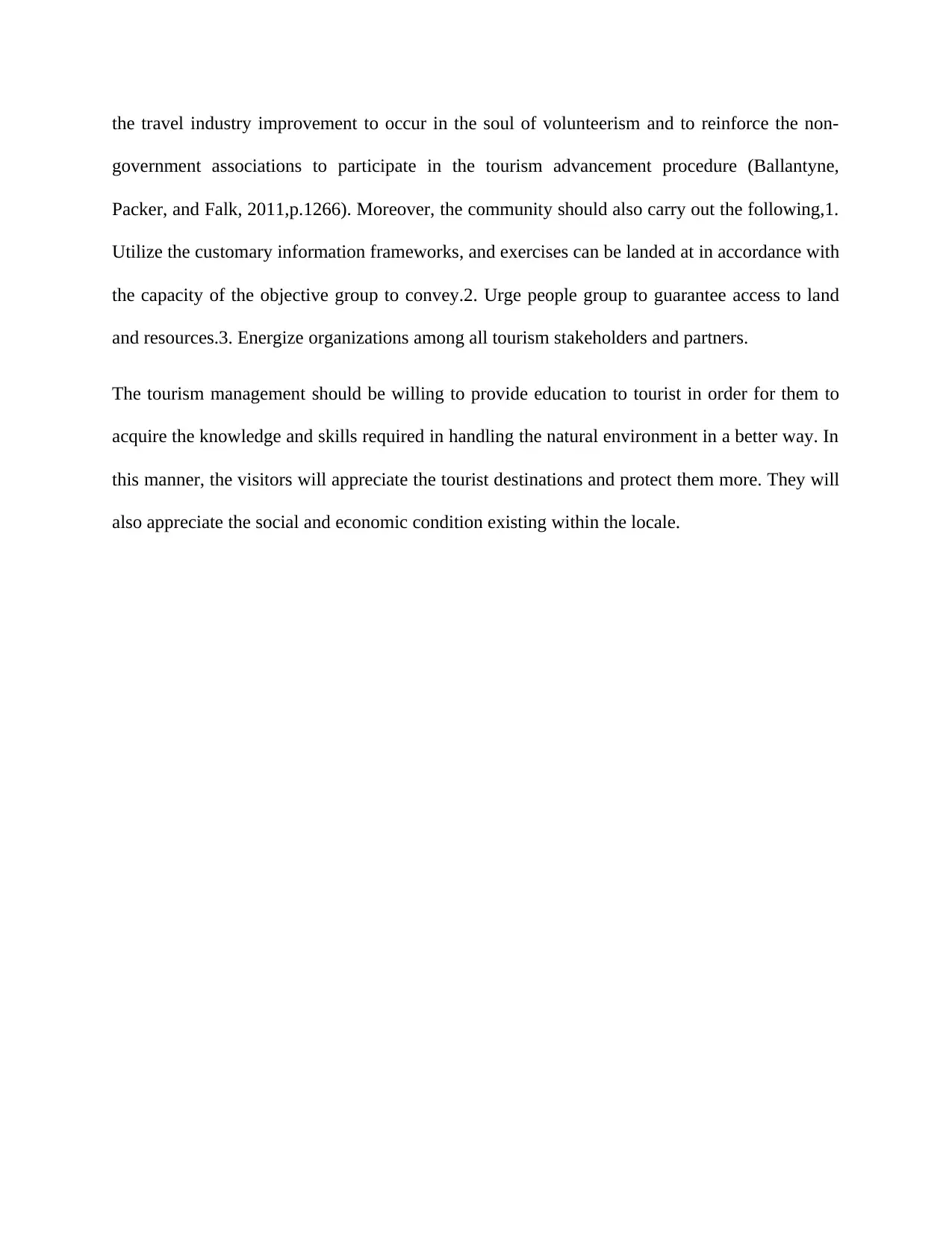
the travel industry improvement to occur in the soul of volunteerism and to reinforce the non-
government associations to participate in the tourism advancement procedure (Ballantyne,
Packer, and Falk, 2011,p.1266). Moreover, the community should also carry out the following,1.
Utilize the customary information frameworks, and exercises can be landed at in accordance with
the capacity of the objective group to convey.2. Urge people group to guarantee access to land
and resources.3. Energize organizations among all tourism stakeholders and partners.
The tourism management should be willing to provide education to tourist in order for them to
acquire the knowledge and skills required in handling the natural environment in a better way. In
this manner, the visitors will appreciate the tourist destinations and protect them more. They will
also appreciate the social and economic condition existing within the locale.
government associations to participate in the tourism advancement procedure (Ballantyne,
Packer, and Falk, 2011,p.1266). Moreover, the community should also carry out the following,1.
Utilize the customary information frameworks, and exercises can be landed at in accordance with
the capacity of the objective group to convey.2. Urge people group to guarantee access to land
and resources.3. Energize organizations among all tourism stakeholders and partners.
The tourism management should be willing to provide education to tourist in order for them to
acquire the knowledge and skills required in handling the natural environment in a better way. In
this manner, the visitors will appreciate the tourist destinations and protect them more. They will
also appreciate the social and economic condition existing within the locale.
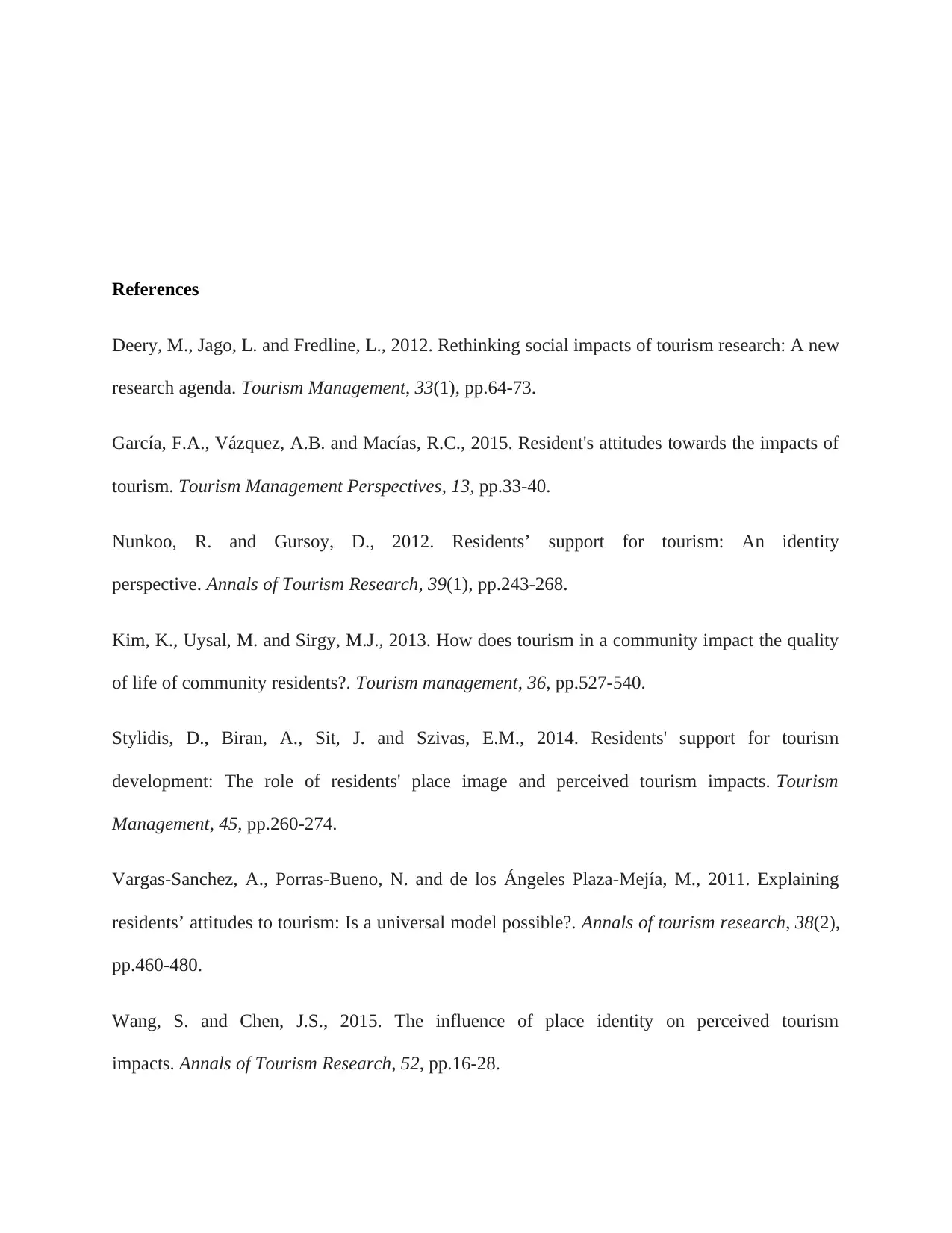
References
Deery, M., Jago, L. and Fredline, L., 2012. Rethinking social impacts of tourism research: A new
research agenda. Tourism Management, 33(1), pp.64-73.
García, F.A., Vázquez, A.B. and Macías, R.C., 2015. Resident's attitudes towards the impacts of
tourism. Tourism Management Perspectives, 13, pp.33-40.
Nunkoo, R. and Gursoy, D., 2012. Residents’ support for tourism: An identity
perspective. Annals of Tourism Research, 39(1), pp.243-268.
Kim, K., Uysal, M. and Sirgy, M.J., 2013. How does tourism in a community impact the quality
of life of community residents?. Tourism management, 36, pp.527-540.
Stylidis, D., Biran, A., Sit, J. and Szivas, E.M., 2014. Residents' support for tourism
development: The role of residents' place image and perceived tourism impacts. Tourism
Management, 45, pp.260-274.
Vargas-Sanchez, A., Porras-Bueno, N. and de los Ángeles Plaza-Mejía, M., 2011. Explaining
residents’ attitudes to tourism: Is a universal model possible?. Annals of tourism research, 38(2),
pp.460-480.
Wang, S. and Chen, J.S., 2015. The influence of place identity on perceived tourism
impacts. Annals of Tourism Research, 52, pp.16-28.
Deery, M., Jago, L. and Fredline, L., 2012. Rethinking social impacts of tourism research: A new
research agenda. Tourism Management, 33(1), pp.64-73.
García, F.A., Vázquez, A.B. and Macías, R.C., 2015. Resident's attitudes towards the impacts of
tourism. Tourism Management Perspectives, 13, pp.33-40.
Nunkoo, R. and Gursoy, D., 2012. Residents’ support for tourism: An identity
perspective. Annals of Tourism Research, 39(1), pp.243-268.
Kim, K., Uysal, M. and Sirgy, M.J., 2013. How does tourism in a community impact the quality
of life of community residents?. Tourism management, 36, pp.527-540.
Stylidis, D., Biran, A., Sit, J. and Szivas, E.M., 2014. Residents' support for tourism
development: The role of residents' place image and perceived tourism impacts. Tourism
Management, 45, pp.260-274.
Vargas-Sanchez, A., Porras-Bueno, N. and de los Ángeles Plaza-Mejía, M., 2011. Explaining
residents’ attitudes to tourism: Is a universal model possible?. Annals of tourism research, 38(2),
pp.460-480.
Wang, S. and Chen, J.S., 2015. The influence of place identity on perceived tourism
impacts. Annals of Tourism Research, 52, pp.16-28.
⊘ This is a preview!⊘
Do you want full access?
Subscribe today to unlock all pages.

Trusted by 1+ million students worldwide
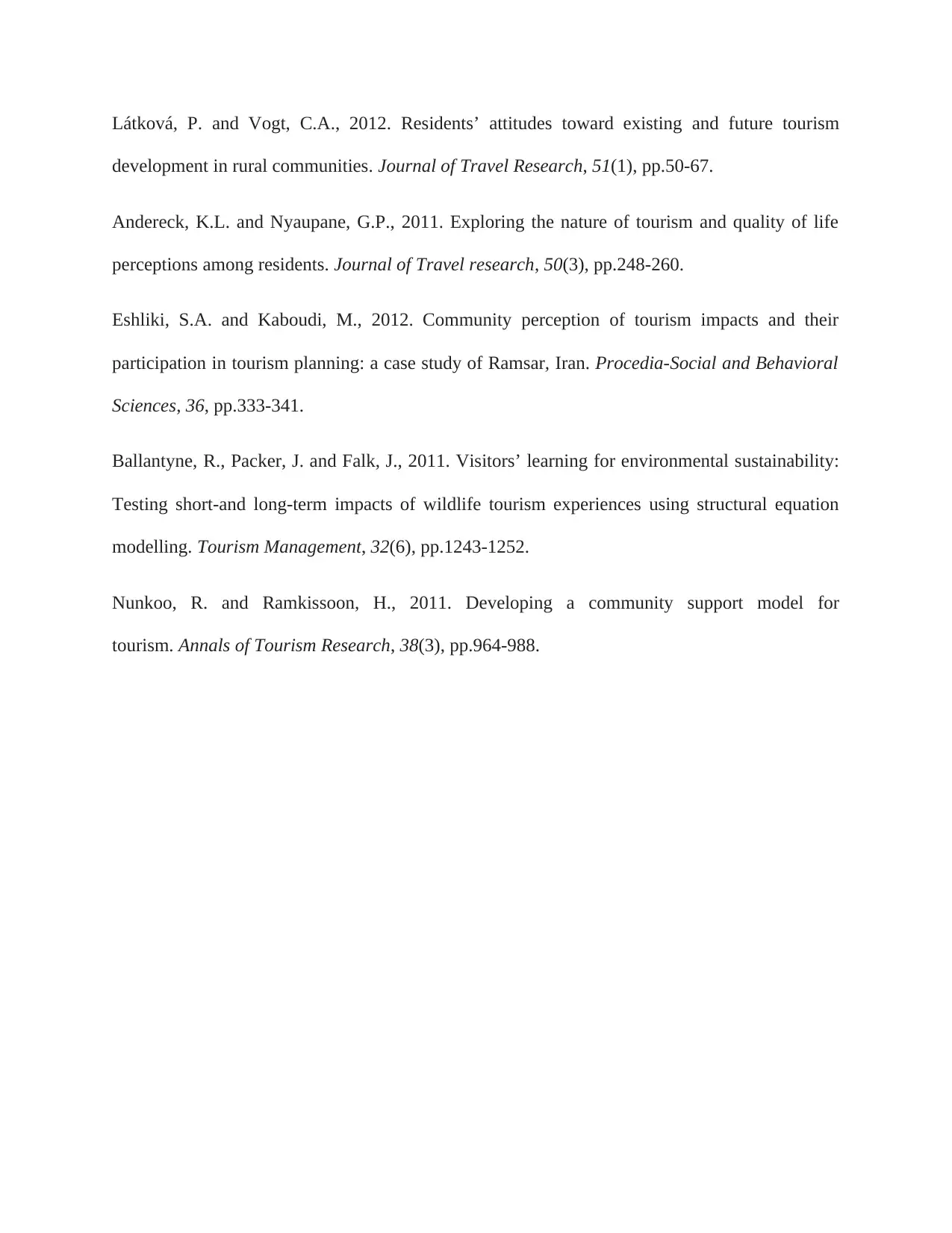
Látková, P. and Vogt, C.A., 2012. Residents’ attitudes toward existing and future tourism
development in rural communities. Journal of Travel Research, 51(1), pp.50-67.
Andereck, K.L. and Nyaupane, G.P., 2011. Exploring the nature of tourism and quality of life
perceptions among residents. Journal of Travel research, 50(3), pp.248-260.
Eshliki, S.A. and Kaboudi, M., 2012. Community perception of tourism impacts and their
participation in tourism planning: a case study of Ramsar, Iran. Procedia-Social and Behavioral
Sciences, 36, pp.333-341.
Ballantyne, R., Packer, J. and Falk, J., 2011. Visitors’ learning for environmental sustainability:
Testing short-and long-term impacts of wildlife tourism experiences using structural equation
modelling. Tourism Management, 32(6), pp.1243-1252.
Nunkoo, R. and Ramkissoon, H., 2011. Developing a community support model for
tourism. Annals of Tourism Research, 38(3), pp.964-988.
development in rural communities. Journal of Travel Research, 51(1), pp.50-67.
Andereck, K.L. and Nyaupane, G.P., 2011. Exploring the nature of tourism and quality of life
perceptions among residents. Journal of Travel research, 50(3), pp.248-260.
Eshliki, S.A. and Kaboudi, M., 2012. Community perception of tourism impacts and their
participation in tourism planning: a case study of Ramsar, Iran. Procedia-Social and Behavioral
Sciences, 36, pp.333-341.
Ballantyne, R., Packer, J. and Falk, J., 2011. Visitors’ learning for environmental sustainability:
Testing short-and long-term impacts of wildlife tourism experiences using structural equation
modelling. Tourism Management, 32(6), pp.1243-1252.
Nunkoo, R. and Ramkissoon, H., 2011. Developing a community support model for
tourism. Annals of Tourism Research, 38(3), pp.964-988.
1 out of 10
Related Documents
Your All-in-One AI-Powered Toolkit for Academic Success.
+13062052269
info@desklib.com
Available 24*7 on WhatsApp / Email
![[object Object]](/_next/static/media/star-bottom.7253800d.svg)
Unlock your academic potential
Copyright © 2020–2026 A2Z Services. All Rights Reserved. Developed and managed by ZUCOL.




